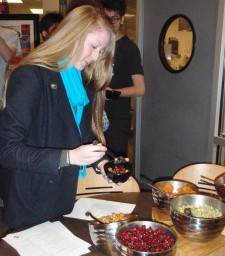Making healthy choices often seems tough for college students. Between social activities, doing homework, and participating in extracurricular, personal well-being can often take a back seat. But Bon Appétit makes the healthy choice the easy, default choice in the dining hall and we were recently recognized for our efforts.

Blog: Education
+ Blog Categories
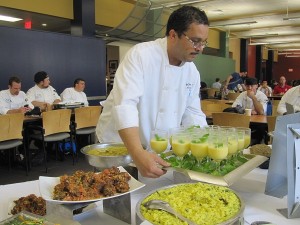
Lessons Learned on the Turmeric Trail
- Blog
This summer, Bon Appétit chefs gathered around the country to learn the ins and outs of cooking authentic Indian cuisine. At Emmanuel College in Boston, I joined a group of New England chefs attending the culinary training, titled “Flavors from the Turmeric Trail” and given by Raghavan Iyer, a native of Mumbai and a celebrated chef, author, and teacher.
Bon Appétit Makes Top 10 List from Her Campus
- Blog
When it comes to food, students know what they like – and what they don’t. Long gone are the times where students would eat mystery meat, things covered in gravy, and canned vegetables. Thanks to Bon Appétit, they don’t have to.
A Fellow’s Farewell
- Blog
Three years ago, I was getting ready to graduate from college with a major in anthropology, which everyone swore was a death sentence for a job search.
I remember clearly the serendipitous meeting that landed me with the Bon Appétit Management Company Foundation. Through a series of extremely random events, I attended a presentation by Bon Appétit CEO and founder Fedele Bauccio, Vice President Maisie Greenawalt, and Foundation Director Helene York. In that one hour, I learned more about the problems of our food system than I had in my entire college career — and that’s despite the fact that I had long been interested in sustainability issues and had even spent time living with organic coffee farmers in Mexico. These three corporate executives talked about things like rBGH, reduced antibiotics in animal husbandry, and sustainable seafood [BAP1] — some issues I had never even heard of. I was blown away.
Employee Spotlight: Nicholas Palazzo of Gallaudet University
- Blog
We serve great food, and the story behind that food has as much to do with the people cooking and serving it as it does the farmers who grew it.
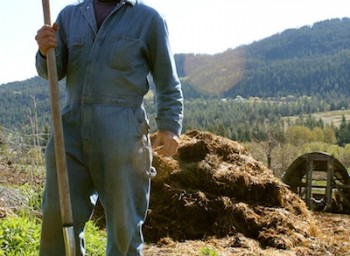
My Week at Quillisascut: Why Everyone Should Go to ‘Farm School’
- Blog
Since I moved to Seattle a year and a half ago, there’s no farm whose name has come up more than Quillisascut, located in the foothills of the Huckleberry Mountains in Rice, WA. And since I visit farms as Bon Appétit Management Company Foundation’s West Coast Fellow, I have lots of conversations about food and farming. Quillisascut is a cheese company, selling what they call “traditional farmstead cheese from the pampered pets of Pleasant Valley,” but it’s also a school for the domestic arts. After completing a five-day “Introduction to Farming” workshop at Quillisascut recently, nicely documented by Farmgirl Gourmet, I understand why this farm school is so beloved by food service professionals, healthcare students, farmers and aspiring farmers, vacationers, and other “co-producers” (as Slow Food and the farm’s cookbook, Chefs on the Farm refer to us “eaters”). Attendees from […]
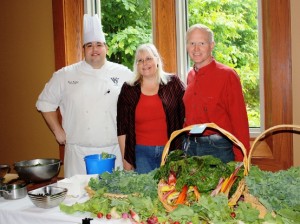
Washington University Grows Farm to Fork Program
- Blog
The question is: How do you connect large volume needs of the University with the very small volume output of most Midwestern family farms? Bon Appétit at Washington University recently hosted a farmer’s meeting, inviting over 35 farmers from Illinois and Missouri, to tackle exactly this question.
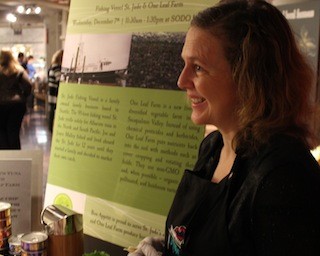
Change Your Tuna: St. Jude Fishers Visits Starbucks’ SoDo Kitchen
- Blog
For Joe and Joyce Malley, albacore tuna fishing is more than an occupation or a sport – it’s a lifelong love affair. And one they pursue thoughtfully.

Bon Appétit Cafés Top the List of Best Universities for Food Lovers
- Blog
From foodies to vegans and the gluten-intolerant, today’s students are increasingly scrutinizing the food at their prospective colleges — and citing its quality and choice as major factors in their decision making. But comparing dining programs can be tough, without tasting food at each school and chatting with the dining services staff. The Daily Meal sought to make the process easier by pulling together a list of the nation’s top 20 colleges and universities, ranked by their food options. Four Bon Appétit accounts made the top 10!
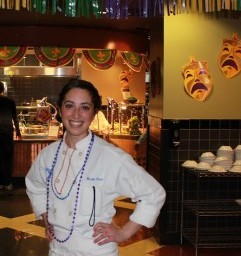
Studying Corporate Sustainability – From the Inside
- Blog
When you’re outside of a company looking in, it’s hard to tell if the sustainability claims it makes are genuine. A year ago, I accepted a position with Bon Appétit Management Company in operations because it was one of a small handful of companies that seemed to be making significant efforts within a constrained food system. I was interested in sustainable business throughout graduate school, and what I heard over and over (and over!) again was: get some experience in operations. If you understand how a factory works or a kitchen runs, you’ll be more valuable to any sustainability team.
